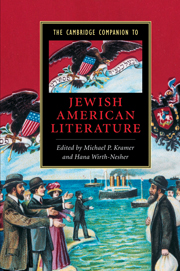Book contents
- Frontmatter
- Introduction: Jewish American literatures in the making
- 1 Beginnings and ends: the origins of Jewish American literary history
- 2 Imagining Judaism in America
- 3 Of crucibles and grandfathers: the East European immigrants
- 4 Coney Island, USA: America in the Yiddish literary imagination
- 5 Hebrew literature in America
- 6 Traces of the past: multilingual Jewish American writing
- 7 Accents of the future: Jewish American popular culture
- 8 Jewish American poetry
- 9 Jewish American writers on the Left
- 10 Jewish American renaissance
- 11 The Holocaust in the Jewish American literary imagination
- 12 Jewish American women writers and the race question
- 13 On contemporary literary theory and Jewish American poetics
- 14 Identity matters: contemporary Jewish American writing
- Index
- Series List
13 - On contemporary literary theory and Jewish American poetics
Published online by Cambridge University Press: 28 May 2006
- Frontmatter
- Introduction: Jewish American literatures in the making
- 1 Beginnings and ends: the origins of Jewish American literary history
- 2 Imagining Judaism in America
- 3 Of crucibles and grandfathers: the East European immigrants
- 4 Coney Island, USA: America in the Yiddish literary imagination
- 5 Hebrew literature in America
- 6 Traces of the past: multilingual Jewish American writing
- 7 Accents of the future: Jewish American popular culture
- 8 Jewish American poetry
- 9 Jewish American writers on the Left
- 10 Jewish American renaissance
- 11 The Holocaust in the Jewish American literary imagination
- 12 Jewish American women writers and the race question
- 13 On contemporary literary theory and Jewish American poetics
- 14 Identity matters: contemporary Jewish American writing
- Index
- Series List
Summary
Over the last decades, a large, even astonishing number of Jewish scholars and critics have come to the fore in various fields of literary study. Their writings have played a large part in revolutionizing these fields, not only in the sense of revising (if not shattering) earlier approaches and assumptions, but also in introducing whole new avenues and attitudes toward literary experience. In some sense, it was their special task to pose such questions as what “literary experience” even is, moving literary investigation from critical commentary on particular texts (although they very much continued to do this, too) to questions concerning what critical commentary is and does: critical commentary on critical commentary. Theirs, in short, was the plunge into literary theory, into reflection on the premises and principles that make up literary study and literature itself.
America has a broad, bright crown of Jewish critics in a wide range of areas: Lionel Trilling, Alfred Kazin, Philip Rahv, Irving Howe, M. H. Abrams, Leslie Fiedler, Marjorie Perloff, Stephen Greenblatt, Susan Gubar – to name only a few. I will discuss, however, only a small group of Jewish American scholars, working largely at Yale from the 1950s onwards, whose writings were highly theoretical and concentrated on poetry and poetics: Harold Bloom, John Hollander, and Geoffrey Hartman – and I will extend the discussion to include Sacvan Bercovitch, who taught at Columbia and Harvard, as the major theorist of a poetics of American culture generally. I focus particularly on poetry and poetics because here reflection on language is most explicit and most pure; and it is a particular reflection on language that comprises the very core of these scholars' theories about literature.
- Type
- Chapter
- Information
- The Cambridge Companion to Jewish American Literature , pp. 250 - 268Publisher: Cambridge University PressPrint publication year: 2003



